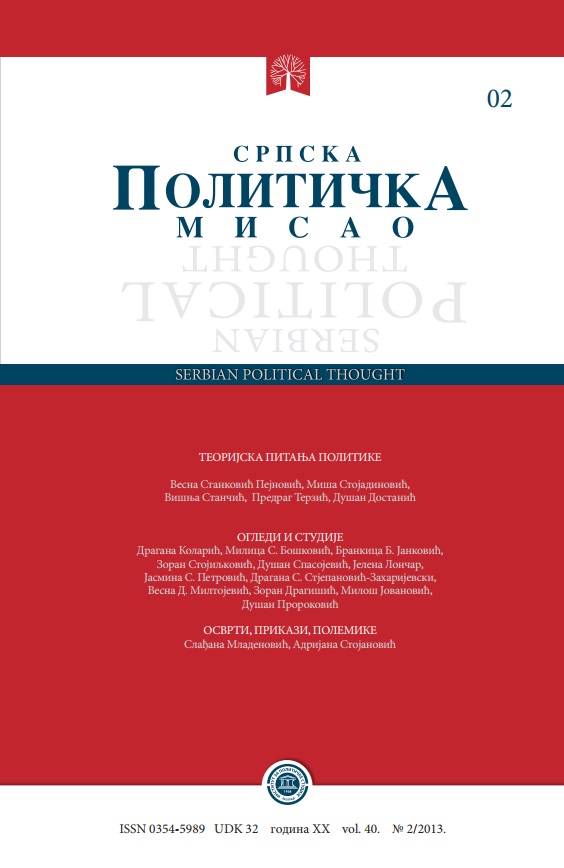Изборна понуда и идеолошко профилисање странака у Србији
Electoral Bid and Ideological Profile of Political Parties in Serbia
Author(s): Zoran Stojiljković, Dušan Spasojević, Jelena LončarSubject(s): Economic policy, Government/Political systems, Electoral systems, Transformation Period (1990 - 2010), Present Times (2010 - today), EU-Accession / EU-DEvelopment, Politics and Identity
Published by: Институт за политичке студије
Keywords: political parties; ideology; electoral campaign; Serbia; post-communist states;
Summary/Abstract: Content analysis of 2012 electoral campaign in Serbia shows that high electoral tension is not based on ideological and programmatic differences among political parties. There are only few exceptions to this conclusion among political parties and political issues analysed. In other words, our research shows that hypothesis on political system structuring in four phases is not valid in the case of Serbia for two reasons: first, the process of party system institutionalization lasts longer than in other transition countries; and second, socio- economic profiling of political parties does not take precedence over identity divisions. The differences in economic programs and positions on a classical left- wing – right- wing scale among political parties are very small. This refers primarily to the two most influential political parties which take central position in the party system – Serbian Progressive Party (Srpska napredna stranka, SNS) and Democratic Party (Demokratska stranka, DS). Different policies are not characteristic of other parties as well; the only difference is in themes and political issues they emphasize during electoral campaign. There are, however, two exceptions from the main trend: Socialist Party of Serbia (Socijalistička partija Srbije, SPS) which moves partly from the central position with more clearly profiled left- wing and redistributive policies and Liberal Democratic Party (Liberalno demokratska partija, LDP) which positions itself as liberal, but increasingly more moderate liberal. There are several explanations of this slow and very gradual positioning of parties in relation to economic issues. First, the space for different policies has been narrowed by economic crisis, dependence on foreign investment and influence of international organizations such as IMF or European Union. Second, professional organizations and trade unions are not strong enough to put their questions and interests forward to the agenda, while banks, influential businessmen and moguls have relatively strong influence on political agenda. Finally, the largest part of Serbian population still expects the state to offer not only business conditions which will attract investment, but also to be itself an important actor in economic field. Because of this, political parties lack interest in standing out different positions on solving social and economic problems of the citizens. On the other hand, identity divisions proved to be very resistant in Serbia, so political parties still clash over main issues of belonging and identity of political community, although this is the fourth election cycle after democratic changes in 2000. Even in this case, the difference between SNS and DS reduced (but is still noticeably higher than in relation to economic issues), while other parties try to maximize identity issues, and in some cases (e.g. LDP and Democratic Party of Serbia (Demokratska stranka Srbije, DSS)) to develop their economic positions based on identity issues. More objective reason for the strength of identity issues is the question of the future status of Kosovo, the problem other post- communist states did not confront. However, even besides Kosovo issues, we find that political parties insist on this line of division from more pragmatic reasons, because they believe, that is the way to develop most successfully party identification among citizens. Yet, relative electoral failure of political parties which played on identity card, neglecting corruption and economic issues, shows that this card cannot be played forever.
Journal: Српска политичка мисао
- Issue Year: 2013
- Issue No: 2
- Page Range: 135-150
- Page Count: 16
- Language: Serbian

